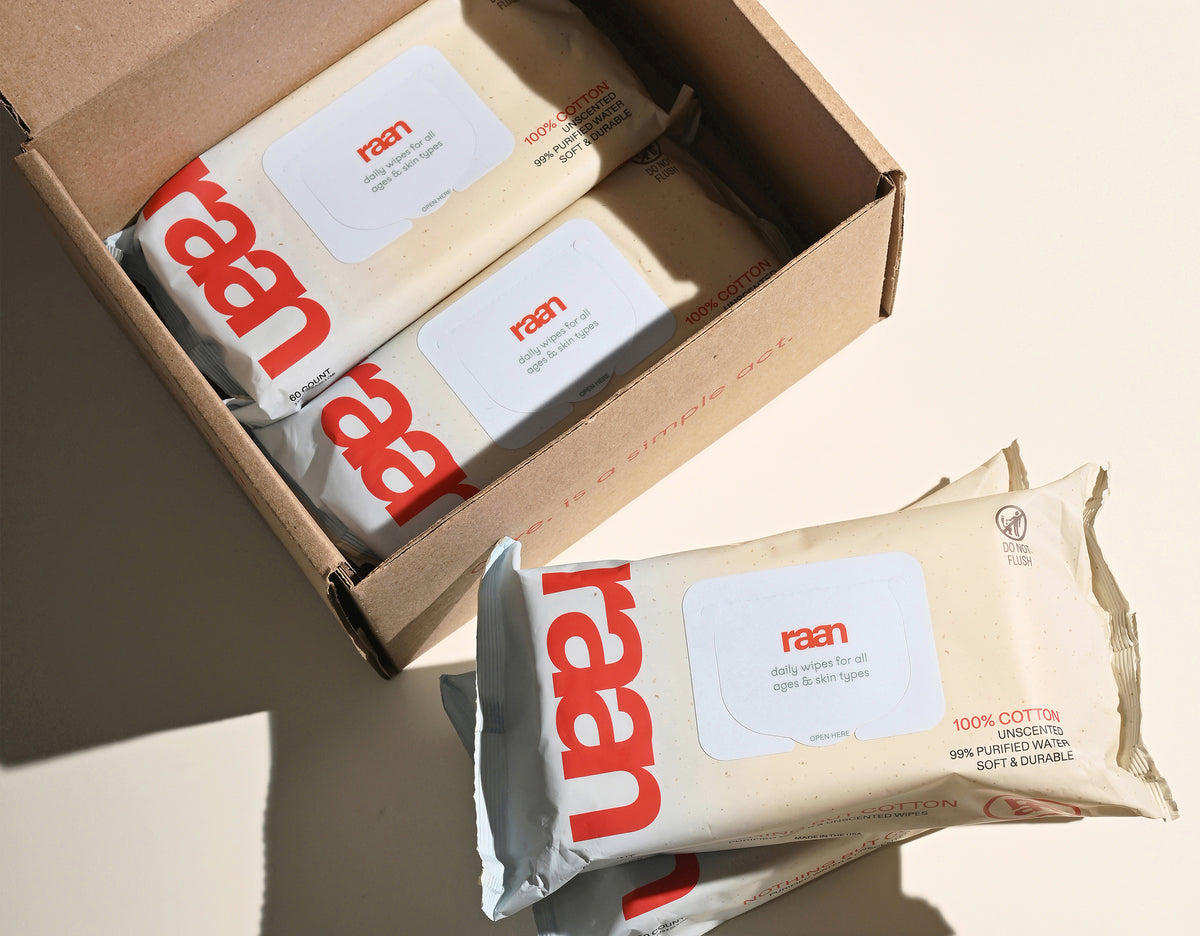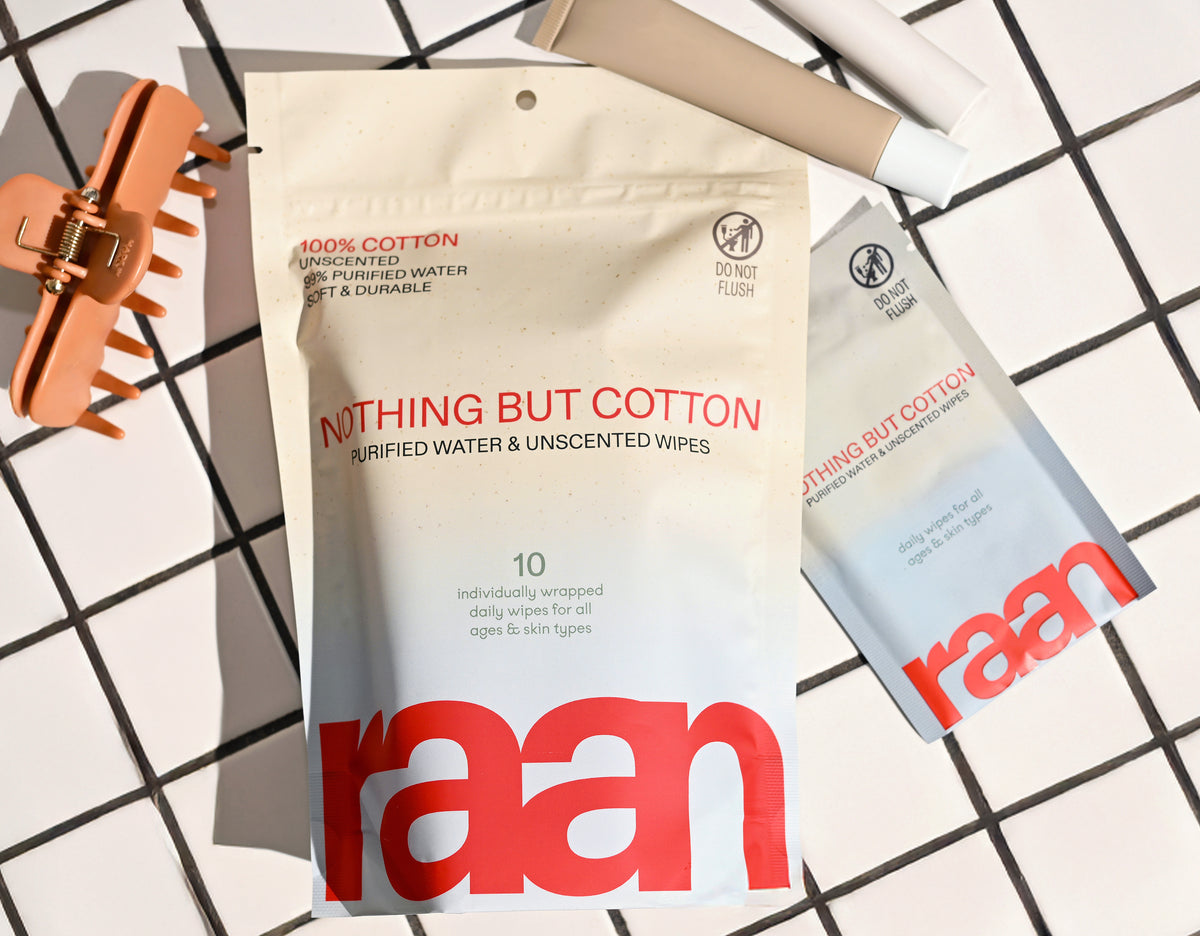Key Takeaways
- The best flushable wipes for adults break down safely in water to prevent plumbing issues.
- Flushable wipes should be gentle enough for everyday use on sensitive skin.
- Many products labeled "flushable" may not fully degrade after flushing.
- It's important to consider both safety for plumbing and skin when choosing wipes.
Table of Contents
- What Are Flushable Wipes for Adults and Why Do People Use Them?
- Are "Flushable" Wipes Really Flushable? Plumbing & Environmental Truths
- Ingredients Matter: What's (and What's Not) in Your Wipe
- Why Cotton Wipes Outperform Synthetic Alternatives
- How to Choose Safe, Truly Flushable Wipes: A Practical Checklist
- Adult Flushable Wipes vs. Alternatives: Complete Comparison
- Side-by-Side Comparison: Leading Adult Flushable Wipes
- Best Flushable Wipes by Specific Needs
- How to Use Flushable Wipes Responsibly
Best Flushable Wipes for Adults: Clean Care Guide
The best flushable wipes for adults should break down safely in water while being gentle enough for everyday use. But here's the reality: most "flushable" labels don't tell the whole story about what happens after you flush, or what's actually touching your skin. Unbleached, 100% cotton wipes are a standout choice for those seeking both safety and gentleness.
We're cutting through the marketing noise to help you find wipes that are truly safe for your plumbing, your skin, and the environment. From ingredient transparency to real flushability standards, this guide covers what actually matters when choosing adult wipes. If you need a portable solution, consider the individually wrapped cotton pocket wipes for sensitive skin.
What Are Flushable Wipes for Adults and Why Do People Use Them?
Flushable wipes for adults are wet wipes designed to dissolve in water after flushing, unlike regular wet wipes that contain plastic fibers. They bridge the gap between dry toilet paper and non-flushable alternatives, offering better cleaning power with the convenience of toilet disposal.
Adults reach for these wipes during postpartum recovery, after workouts, while traveling, or when caring for elderly family members. They're also popular among people with sensitive skin conditions who need gentler cleansing than traditional toilet paper provides.
Who Uses Adult Flushable Wipes?
- New parents: Postpartum care and family hygiene needs
- Active adults: Post-gym refresh and on-the-go cleaning
- Caregivers: Assisting elderly or disabled family members
- Sensitive skin users: Gentler alternative to rough toilet paper
- Travelers: Portable hygiene solution for unreliable facilities
The key difference from baby wipes? Adult formulations often focus on stronger cleaning power and faster breakdown times, though the safest options still use minimal, skin-friendly ingredients.
Are "Flushable" Wipes Really Flushable? Plumbing & Environmental Truths

The term "flushable" isn't federally regulated, which means brands can slap this label on products that technically go down your toilet but wreak havoc downstream. True flushability requires wipes to break apart quickly in water, similar to toilet paper.
Industry standards like IWSFG (International Water Services Flushability Group) guidelines test for disintegration, but many products labeled "flushable" still fail these benchmarks. Municipal water authorities report that wipes, even those labeled flushable, cause significant blockages and expensive repairs. For more on the environmental and plumbing impact, see this case against flushable wipes from McGill University.
The Breakdown Time Reality
Toilet paper disintegrates within seconds of flushing. Most flushable wipes take minutes to hours, and some never fully break down. This creates "fatbergs", massive clogs of wipes, grease, and debris that cost cities millions annually to remove.
Even wipes that eventually dissolve can cause problems in older plumbing systems or septic tanks. The safest approach? Look for certifications from recognized testing bodies and consider your specific plumbing situation.
Municipal Warning: Cities like New York and London have launched campaigns asking residents to avoid flushing any wipes, regardless of labeling, due to infrastructure damage.
Ingredients Matter: What's (and What's Not) in Your Wipe
The best flushable wipes for adults contain simple, recognizable ingredients that won't irritate skin or harm waterways. Yet many brands pack their formulas with synthetic preservatives, fragrances, and harsh chemicals that serve no real purpose beyond marketing appeal.
Safe wipe ingredients include purified water (which should make up 99% of the formula), food-grade preservatives like sodium benzoate, and gentle moisturizers like organic aloe. These components clean effectively while remaining gentle enough for sensitive areas.
What to Avoid in Adult Wipes
| Harmful Ingredients | Why to Avoid | Better Alternatives |
|---|---|---|
| Synthetic fragrances | Common allergen, unnecessary irritation | Unscented formulations |
| Plastic fibers | Never break down, clog pipes | 100% cotton or plant-based materials |
| Parabens | Hormone disruption concerns | Food-grade preservatives |
| Bleach/chlorine | Skin irritation, environmental harm | Unbleached natural materials |
Look for EWG Verified products, which undergo rigorous screening for ingredient safety. This certification ensures every component meets strict health standards without harmful additives. For those with delicate skin, you may also find value in this best wipes for delicate skin care article.
Why Cotton Wipes Outperform Synthetic Alternatives
Unbleached, 100% cotton wipes represent the gold standard for adult flushable wipes. Cotton naturally biodegrades faster than synthetic blends while providing superior gentleness for sensitive skin. Unlike plastic-fiber wipes that merely fragment into microplastics, cotton breaks down completely.
For those who want a convenient bundle, the mess-ready pack offers a practical way to stock up on flushable, gentle wipes for every scenario.
How to Choose Safe, Truly Flushable Wipes: A Practical Checklist

Evaluating wipes for real flushability requires looking beyond marketing claims to actual certifications and testing standards. Start by checking for IWSFG (International Water Services Flushability Group) guidelines compliance, this indicates the product has passed specific disintegration and dispersibility tests that mirror real sewer conditions.
Next, examine the material composition. Unbleached, 100% cotton wipes break down more reliably than synthetic blends or bamboo-viscose combinations. The fiber length and weave density affect how quickly the wipe disperses in water, shorter fibers and looser weaves typically perform better in plumbing systems.
Your 5-Point Safety Checklist:
- Material verification: Confirm 100% natural fiber content (cotton, not "cotton blend")
- Certification check: Look for EWG Verified, Natural Cotton Seal, or equivalent third-party validation
- Ingredient transparency: Every component should be listed and explained
- Home dispersibility test: Drop one wipe in a jar of water, shake vigorously for 10 seconds, it should start breaking apart
- Packaging honesty: Brands confident in their flushability will provide clear disposal instructions, not vague suggestions
Remember that "flushable" doesn't always mean advisable for your specific plumbing situation. Older pipes, septic systems, and low-flow toilets may struggle even with properly certified wipes. When in doubt, dispose in trash rather than risk expensive repairs.
Adult Flushable Wipes vs. Alternatives: Complete Comparison
Understanding when to reach for flushable wipes versus other options depends on your specific situation and priorities. Traditional toilet paper excels in cost and universal flushability, but falls short on thorough cleaning and skin comfort. Non-flushable wet wipes offer superior cleansing but create disposal challenges and environmental concerns.
| Product Type | Material | Flushability | Skin Gentleness | Environmental Impact |
|---|---|---|---|---|
| Premium Flushable Wipes | 100% Cotton | Certified safe | Excellent | Biodegradable |
| Standard Toilet Paper | Wood pulp | Universal | Basic | Low impact |
| Wet Wipes (Non-flushable) | Synthetic blend | Never flush | Good | Landfill waste |
| Bamboo Toilet Paper | Bamboo fiber | Generally safe | Good | Sustainable |
Flushable wipes shine in specific scenarios: post-workout cleanup when you can't shower immediately, travel situations with questionable restroom cleanliness, managing sensitive skin conditions, or caring for family members who need extra hygiene support. They bridge the gap between toilet paper and non-flushable wipes, offering a practical, gentle solution for everyday messes.
How to Use Flushable Wipes Responsibly
Even the best flushable wipes for adults require proper usage to avoid plumbing issues and environmental harm. For more on the science and safety of flushable wipes, see this peer-reviewed article on flushable wipes.
Frequently Asked Questions
What criteria should I look for to ensure that flushable wipes are truly safe for plumbing and the environment?
Look for wipes made from biodegradable, natural fibers that break down quickly in water. Certifications or testing that prove safe disintegration help avoid plumbing clogs. Also, check for minimal, non-toxic ingredients and packaging that reduces plastic waste to support environmental safety.
How do flushable wipes for adults differ from regular baby wipes and toilet paper in terms of ingredients and breakdown?
Adult flushable wipes often use fibers that dissolve more readily in water compared to baby wipes, which may contain plastic fibers. Unlike toilet paper, these wipes provide gentle moisture and cleansing without harsh additives, but they must break down fully to avoid plumbing issues.
Why are unbleached 100% cotton wipes recommended for sensitive skin and better flushability?
Unbleached 100% cotton wipes avoid harsh chemicals and synthetic fibers, reducing irritation for sensitive skin. Their natural fibers also break down more easily in water, making them a safer choice for plumbing and the environment compared to plastic-based wipes.
What are the common misconceptions about the term "flushable" on wipe packaging, and how can consumers avoid products that cause plumbing issues?
Many wipes labeled "flushable" don’t fully break down and can clog pipes or harm sewage systems. To avoid this, choose wipes with clear biodegradability standards, natural fibers like cotton, and transparent ingredient lists, steering clear of plastic fibers and vague claims.






